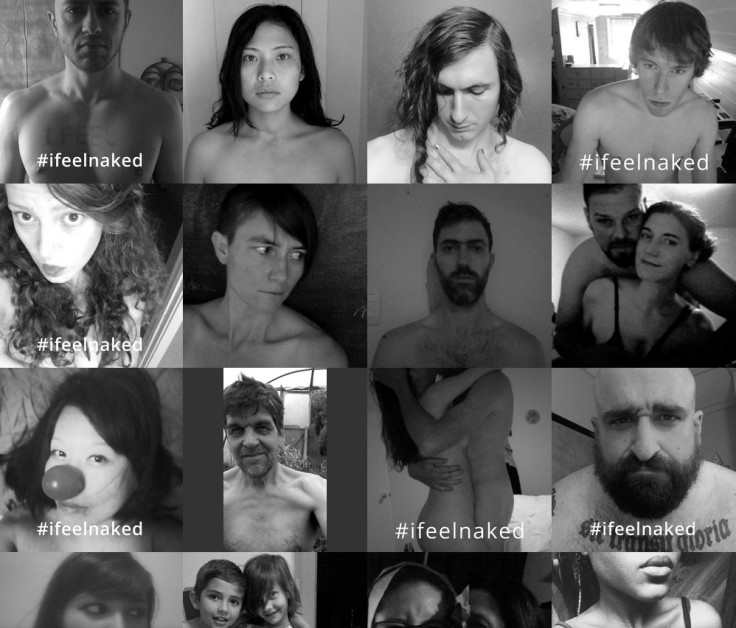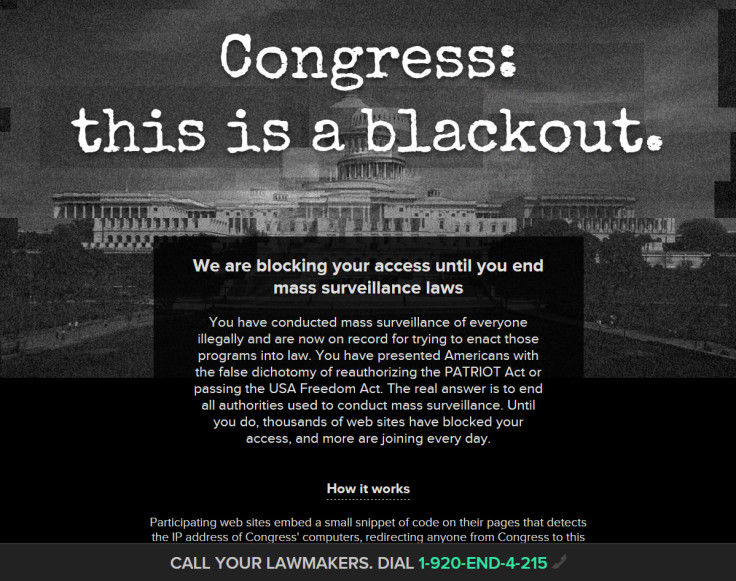Blackout Congress: 14,000 websites are redirecting Congress to naked NSA protester photos

More than 14,000 websites in the US have signed up to block Capitol Hill workers from being able access their sites, in an activist movement designed to make sure the highly controversial Patriot Act allowing government mass surveillance is phased out.
The Blackout Congress campaign, created by Fight for the Future is seeking to block all Congressional IP addresses from accessing popular websites. Websites need to enter a line of code, which makes their website instantly redirect to a photo feed of naked anti-NSA protesters if it detects a Capitol Hill IP address.
On 1 June, some of the key aspects of the Patriot Act, such as Section 215 which enables NSA to carry out mass surveillance of citizens, will be expiring.
Congress is set to vote on the future of the bill, and if it does nothing, the laws will expire, but there are concerns that the US government is trying to reauthorise these mass surveillance of online communications by getting Congress to pass the USA Freedom Act.
"Congress voted to authorise the government's illegal mass surveillance programmes. This is their mess to clean up," Fight for the Future co-founder Tiffiniy Cheng told IBTimes UK.
"People are fed up. No one wants to live in a world without privacy where they aren't free to express themselves. People will continue to stand up and fight for free speech, and Congress should expect nothing but resistance until they end these abusive programs that threaten our most basic rights."
US government says no surveillance affects national security

The US government claimed in a recent interview with The New York Times that it is essential for its intelligence agencies to have access to encrypted data, otherwise the government would be "playing Russian roulette with national security".
"We're in uncharted waters," a senior member of the administration said at a briefing organised by the White House, where three officials spoke with reporters about the consequences of inaction by Congress. "We have not had to confront addressing the terrorist threat without these authorities, and it's going to be fraught with unnecessary risk."
On 28 May, NSA director Admiral Mike Rogers said at the NATO cyberwarfare conference CyCon 2015 in Estonia that encryption was important, but there needed to be a legal framework to protect citizens' rights, while enabling governments to access encrypted data for the good of national security.
"You're not going to hear me say that encryption is a bad thing. I don't think it is a bad thing. Encryption is not bad. Encryption is a fundamental part of the future; I think it would be ridiculous to pretend otherwise,"Rogers, who is also head of US Cyber Command, told ZDNet.
"I hope we do not find a world in which the internet becomes something that fractures and where the ability to move information freely is controlled. The seas around the world are, much like the cyber domain, not governed by one single nation. We have created maritime norms and have to do the same in the cyberspace to ensure a flow of information and ideas."
Will enough websites sign up to make the blackout work?
At the moment, the websites that have signed up to block access to Congress are mostly personal WordPress websites, although Fight For The Future says that large Internet Defense League member sites, which include the likes of Reddit, Mozilla, Cheezburger, Fark, 4chan, and WordPress, are now evaluating its code.
Although the campaign is gaining great interest on Reddit in the r/technology/ subreddit and has over 5,834 up votes, it is unlikely that it will make a big impact on Congress unless big players actively blackout the internet.
Back in 2012, the Stop Online Piracy Act (Sopa) and Protect IP Act (Pipa) protests spurred Google, Wikipedia, Mozilla, Reddit and WordPress, together with more than 7,000 other sites, to get on board and block access to their content. However, Google only changed its homepage to mark the event.
Cheng is positive that major websites will join the campaign, especially since 14,000 websites signed up in less than 24 hours.
"This protest is organic and happening from the bottom up. The Internet taking on unchecked power – it's amazing," she said.
© Copyright IBTimes 2025. All rights reserved.






















